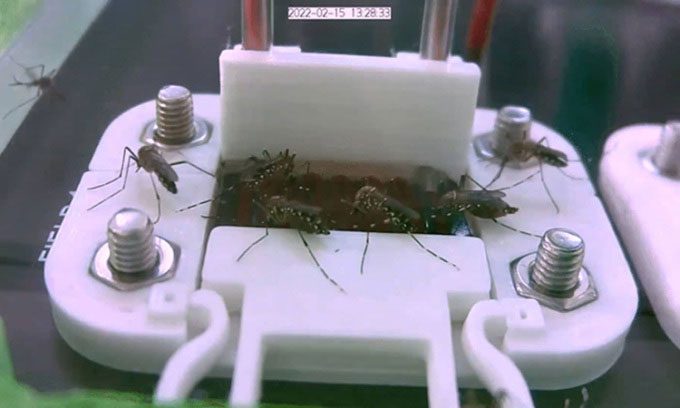The artificial skin, 3D printed from flexible hydrogel material, contains grooves that simulate blood vessels to attract mosquitoes and aid in the research of infectious diseases.
To study and find ways to prevent insect-borne diseases, many volunteers have to place their hands in a tank filled with mosquitoes for them to bite. A team of biological engineers at Rice University has developed a new artificial skin that contains real blood for mosquitoes, helping volunteers avoid itchy bites. This new research was published in the journal Frontiers in Bioengineering and Biotechnology on February 9.

Mosquitoes feeding on artificial skin infused with blood. (Photo: Tulane University)
The artificial skin is 3D printed at the School of Public Health and Tropical Medicine at Tulane University. The research team fabricated skin from hydrogel – a jelly-like, water-retaining material. The hydrogel pieces are filled with grooves that mimic blood vessels, capable of pumping various liquids, including the blood of humans and other animals.
For testing, the research team pumped warm human blood into the hydrogel pieces and placed six pieces into a plastic container filled with mosquitoes. The container was also equipped with cameras focused on each piece of skin. The experts then used a machine learning model to analyze the videos and determine whether certain mosquito species would feed on the blood in the hydrogel.
Next, the researchers coated the common mosquito repellent DEET on some hydrogel pieces, while others were coated with plant-based repellents, and the rest were left uncoated. The experts observed that in the tank containing the uncoated synthetic skin pieces, 13.8% of the mosquitoes fed on blood. While this is a relatively low rate, they believe that increasing the size of the skin pieces would encourage blood-feeding behavior. Another suggestion is to warm the hydrogel, as mosquitoes are attracted to warm surfaces. In the tanks with DEET-coated and plant-based repellent-coated skin, no mosquitoes fed on blood.
The team stated that this new research could allow laboratories to conduct more experiments at a lower cost, as there would be no need to recruit volunteers or purchase test animals. The artificial skin could also provide a more standardized method for studying the spread of infectious diseases.
Scientists have used hydrogel and machine learning models in the lab to study the transmission of dengue fever, but in the future, they plan to use the artificial skin in natural environments and adjust the liquids within the hydrogel to observe how mosquito species behave.



















































